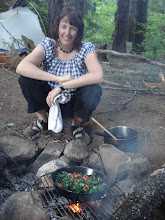But let me caveat last night's loaves - they were indeed sour, with an excellent crusty yet chewy crust and a good crumb, but not as chewy as I think a ciabatta should be. It was really good bread, but still doesn't fit my imaginary endpoint for this year.


Some detail then. For these ciabatta, I did a series of short kneads of a fairly wet dough, though not so sticky I couldn't handle it, with ever-increasing proving times. So maybe 10 second kneads three times with about 10 minutes in between each, then about a 2-hour rise before splitting the dough, stretching it carefully and allowing another half-hour rise. Into a very hot oven (250C) with a water bath on the top shelf & a quick spray of the loaves at the beginning & one midway through baking. My starter, Fran, is currently mostly organic wholemeal flour, and the flour I added for these was organic unbleached. I didn't add any commercial yeast as I was looking for a flat bread anyway. This was lazy baking at its finest, and the results were lovely.
A few nights earlier, I whipped Fran up into some rye dinner rolls to have with our soup.
 They achieved exactly the soft, pliable texture you want from rolls, with crusty crusts. This dough was wetter than the ciabatta, and I added some commercial yeast for a better rise to great effect.
They achieved exactly the soft, pliable texture you want from rolls, with crusty crusts. This dough was wetter than the ciabatta, and I added some commercial yeast for a better rise to great effect.
 I've also embraced the joys of sourdough pizza crust, which goes perfectly with the salty, spicy combination of Stuart's home-cured olives, anchovies, bacon and chilies, plus garden-fresh tomatoes and basil and a thin lashing of homemade passata.
I've also embraced the joys of sourdough pizza crust, which goes perfectly with the salty, spicy combination of Stuart's home-cured olives, anchovies, bacon and chilies, plus garden-fresh tomatoes and basil and a thin lashing of homemade passata.So it seems my 'specialty' breads are the winners thus far, as my loaves have often been unwilling to give me a good rise. They do say that sourdough starters are unreliable leaveners, and I'm finding this to be distinctly true. Check out my most hilariously unintentionally flat loaf, which still tasted quite nice, though a bit dry (and hell on the toaster, let me tell you!)
 When I'm looking for a higher loaf, especially for toasting, I'm learning to add commercial yeast. It doesn't affect the flavour, which is invariably sour, but gives the bread the lift that Fran seems unable to offer.
When I'm looking for a higher loaf, especially for toasting, I'm learning to add commercial yeast. It doesn't affect the flavour, which is invariably sour, but gives the bread the lift that Fran seems unable to offer. I should add that the sourness is wildly variable as well, though predictably so. If Fran hasn't made some bread for more than a few days, she gets rather sour. If I'm making bread every day or two, she's less sour. The metaphors write themselves, so I won't bother here.
I should add that the sourness is wildly variable as well, though predictably so. If Fran hasn't made some bread for more than a few days, she gets rather sour. If I'm making bread every day or two, she's less sour. The metaphors write themselves, so I won't bother here.This last loaf below was my sourest to date (and by the way, given my California origins, I'm looking for the sourest of the sourdoughs!), and it also had the best crumb, even though it didn't rise much.
 If you check out the dough below, you'll see I really took Annette's advice to heart on this one and worked a really sticky, wet dough. In fact, it finally inspired me to get a proper dough scraper to assist with this rather messy method.
If you check out the dough below, you'll see I really took Annette's advice to heart on this one and worked a really sticky, wet dough. In fact, it finally inspired me to get a proper dough scraper to assist with this rather messy method.
I feel almost guilty that for those of you out there looking for a scientific account of breadmaking, I'm just tossing around vague generalities. But these days, I cook by touch, smell, taste and imagination, rather than ratios. There are obviously ratios involved, but given my propensity to constantly adjust them by a smidgen, I'm afraid I can't really offer much insight into quantities of what's in my bread.
I think one of the best things about my relaxed approach has been the way it makes breadmaking seem like a simple and lovely thing to do, much like making the children a milkshake rather than mastering a croquembouche. It means I wander into the kitchen, see Fran on the bench and think, 'Hey, I might get some bread started,' and then wander in and out of the kitchen to tend to the dough over the afternoon or evening. The other positive outcome is the exciting array of outcomes - this is no McDonald's where you can expect the same burger every time, no matter where you are - open your palate and be prepared to be surprised at every new loaf of bread. :-)

2 comments:
I want to get into bread making, but with only two of us not eating much bread, it seems pointless! Have you tried freezing any of the bread?
I don't freeze it as I'm fascist about the flavour and texture of fresh bread. Another solution though is that you can actually just make smaller loaves really easily! :-) Go for it!
Post a Comment